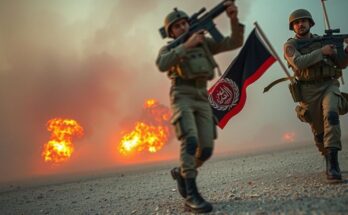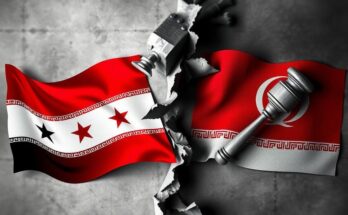The latest reports highlight escalated tensions in the Middle East, with Netanyahu stating Israel will only target Iranian military sites. Qatar’s Emir condemns Israeli actions as collective genocide, while the UN stresses the protection of peacekeepers amid violence across Lebanon and Gaza. Casualties continue to rise significantly with proposals for humanitarian aid restrictions in northern Gaza, raising concerns regarding the dire humanitarian situation.
In the latest developments surrounding the Middle Eastern crisis, tensions have escalated significantly, particularly in light of recent military actions and international diplomatic responses. Israeli Prime Minister Benjamin Netanyahu has reportedly informed the Biden administration that Israel intends to focus its military strikes in Iran on military targets, specifically excluding oil and nuclear facilities. This statement followed Iran’s missile barrage against Israeli positions, which occurred on October 1, prompting reconsideration of Israel’s military strategy vis-à-vis Iran. Analysts have raised concerns that targeting Iranian oil facilities could result in soaring global energy prices, while attacks on nuclear sites could provoke a larger U.S. military engagement in the conflict. Sheikh Tamim bin Hamad Al-Thani, the Emir of Qatar, has condemned what he perceives as Israel’s deliberate expansion of its military operations in the West Bank and Lebanon, labeling the ongoing situation as a form of “collective genocide” against the Palestinian people. He emphasized Qatar’s longstanding warnings regarding Israeli actions that go unpunished. Additionally, the United Nations Security Council voiced grave concerns over the safety of UN peacekeepers injured amidst clashes between the Israeli military and Hezbollah militants, asserting that such personnel must never be targeted. Netanyahu vehemently denied accusations of deliberately harming UN forces, insisting that Hezbollah uses UN positions as shields. As violence continues, including an Israeli airstrike that resulted in numerous casualties in northern Lebanon and in Gaza, humanitarian ramifications are becoming increasingly dire. Reports indicate the staggering toll of at least 42,289 Palestinian deaths and 98,684 injuries due to Israeli strikes since the outbreak of hostilities in October. Additionally, there are proposals from Israeli military leaders to restrict humanitarian aid to northern Gaza, effectively creating a closed military zone that could exacerbate the humanitarian crisis.
The ongoing conflict in the Middle East, particularly between Israel and Iranian-backed groups like Hezbollah, has drawn significant international attention, especially following Israel’s recent military actions in Lebanon and Gaza. The involvement of the United Nations Peacekeeping forces, known as Unifil, underscores the complexity and urgency of maintaining stability in the region. Qatar’s leadership has overtly criticized Israel’s military strategy, highlighting incidents that they equate to genocide. Furthermore, Netanyahu’s communications with the Biden administration mark a critical point in U.S.-Israeli relations, as considerations around striking Iranian military capabilities continue amid escalating tensions.
In summary, the Middle East crisis remains volatile, with Israel’s military strategy shifting towards targeted military actions and affirmations of a commitment to avoid strikes on Iranian oil and nuclear sites. The mounting humanitarian toll across the region garners attention from international bodies, while regional leaders express condemnation of Israeli operations. The implications of these developments necessitate careful observation as diplomatic engagements continue to unfold amidst ongoing military confrontations.
Original Source: www.theguardian.com



